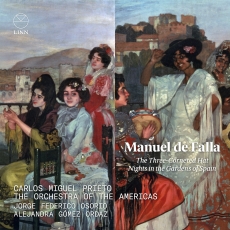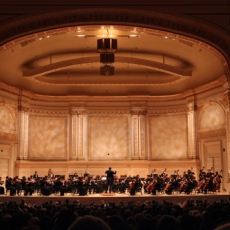The Orchestra of the Americas & Carlos Miguel Prieto - de Falla - Gramophone
The Orchestra of the Americas and Carlos Miguel Prieto have opted for the familiar Falla pairing of El sombrero de tres picos and Noches en los jardines de España for their second disc for Linn, recorded live in Mexico during performances that roughly coincided with the centenary of Sombrero's premiere in July 1919. Prieto's interpretation of the ballet is for the most part extremely fine, if occasionally low-key. Once past the trumpets, drums and shouts of 'Olé' in the Introduction, he takes his time with it, underscoring the sensuousness of Falla's orchestration, and carefully controlling the gathering tensions before releasing them in a heady, exultant account of the final Jota.
The orchestra itself is effectively a training ground for musicians aged between 18 and 30, which Prieto, music director since 2011, has forged into a superb ensemble. There's some beautifully detailed playing, with ravishing strings in the Seguidillas and majestic flamenco turns at the start of the Miller's Farruca, while the brass are gleamingly assertive throughout. Prieto permits the hypocritical Corregidor a certain staid elegance in his minuets, avoiding the usual caricature. The downside here, though, is that the comic scenes could do with more bite, while elsewhere everything feels a bit too considered, particularly when compared with the sheer exhilaration and panache of Pablo Heras-Casado's recent version for Harmonia Mundi.
Prieto's careful way with Falla is arguably better suited to Noches en los jardines de España, where the orchestral playing is finely textured and the debts to Debussy, Ravel and early Stravinsky are all acknowledged without losing sight of Falla's often astonishing originality. Jorge Federico Osorio, playing with unusual weight of tone, steers a course somewhere between the poetry of Alicia de Larrocha (with the LPO and Rafael Frühbeck de Burgos) and the greater dramatic fire of Javier Perianes (with the BBC SO and Josep Pons), though on a disc that is otherwise scrupulously engineered and balanced, the piano sounds very far forwards and the orchestra some way back.
The first of the two fillers is the familiar extract from La vida breve: the Dance is a bit genteel, though the preceding Interlude is grandly post-Romantic and passionate. The second is the Goyescas Intermezzo, beautifully done and discreetly placed just before Noches as as a quiet reminder that Granados's terrible death, days before the Falla's premiere, would have been fresh in the minds of the work's first audience.



